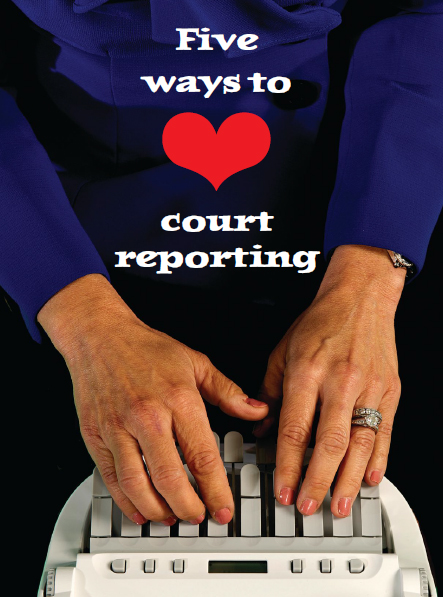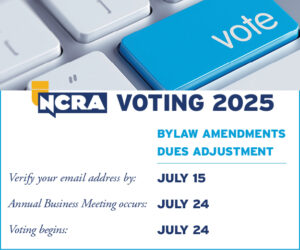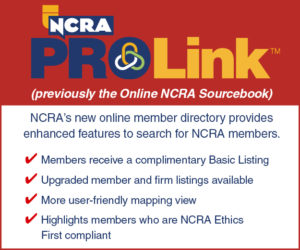
NCRA announced that “National Court Reporting and Captioning Week” will be held February 17-23, 2013, as a way to get attention about what great careers court reporting, captioning, and CART can be. Want to help? Here’s how.
When NCRA announced National Court Reporting and Captioning Week, the JCR got in touch with NCRA’s new Senior Director of Marketing and Communications, Christina Lewellen, to find out more about this new initiative. She described a multi-pronged campaign that will include schools, reporters, state associations, and NCRA working together to promote the profession to prospective students and also to the general public. “Based on member feedback on the NCRA Member Needs Survey,” Lewellen says, “we know that many court reporters feel that the public at large doesn’t understand the importance of the court reporter or captioner. We wanted to do something to draw attention to the profession, and we know that our best advocates are court reporters themselves.”
NCRA will launch the week with a number of press releases to news organizations about the week and the profession to draw attention to how court reporters are integral to the effective functioning of our legal systems, as well as how important captioning and CART are to people who are Deaf or hard of hearing. NCRA’s Government Relations department has also asked that Congress officially recognize the week. Finally, NCRA will be launching a social media campaign that will highlight a new video about the professions in the hopes that it will make more students consider taking classes for court reporting.
But she emphasized, “Getting all of NCRA’s members to do something, even if it is something small, like changing their Facebook picture for the week, can do a lot to raise people’s awareness of the profession.”
1. SHOW YOUR STUFF TO HIGH SCHOOL STUDENTS
One of the best ways to promote the court reporting and captioning professions is to take it to the source: high school and middle school students. Contact your local high school counselor to see if you can come in for a class period to talk about the profession and the many options it offers. As you know, stenographic skills can open many different career options, including court reporting, live-event captioning for the deaf and hard-of-hearing community, captioning for broadcast and specialized videography. In addition, the strong marketplace demand means court reporting offers an abundance of long-term career opportunities. “Court reporting is consistently ranked as one of the top career options as it offers both flexibility and significant income potential,” notes Jim Cudahy, CEO and executive director of NCRA.
If you’re nervous about making a presentation, consider enlisting a colleague who can talk while you realtime the presentation. There’s nothing like showing realtime in action to get people excited. If you need additional help in getting started, check out the NCRA website. NCRA plans to post a PowerPoint presentation and basic talking points to get you started.
2. INTERVIEW A VETERAN
Court reporters’ participation in the Veterans History Project has been a win-win-win all the way around. Since the inception of the Veterans History Project in 2003, the National Court Reporters Foundation has worked with the United States Library of Congress. The collaboration has been a win for veterans and the Library, as well as the historians who now have access to transcripts of the many oral histories sent to the Library. It has been a win for the many court reporters, captioners, legal videographers, students, teachers, and firm owners who have participated, who talked about how meaningful this volunteer opportunity has been to them. Finally, it has been a win for the profession as a whole, because when court reporting firms and court reporting programs have organized Veterans History Project days, they have reached out into the community and shown people how important eyewitnesses to history really are — and how stenographers are among the few who can turn those oral reports into an accessible written document.
Get involved in the Veterans History Project through the NCRA website, or contact Beth Kilker, NCRF’s Oral Histories Program Coordinator, at bkilker@ncra.org.
3. TELL LAWYERS AND JUDGES HOW TO MAKE A RECORD
Another of NCRF’s programs for court reporters is the “Making the Record” Legal Education program, a presentation kit for court reporters to help them explain the importance of the record to attorneys and judges. The presentation offers tips on how to present the information and a script and PowerPoint presentation to give you a good start on your own presentation. In addition, you can download the “Making the Record” brochure and copy it for the people attending your session. All of these materials can be found on the NCRA website.
4. GET SOCIAL WITH IT
If you are a fan of social media and have a Twitter, Facebook, or LinkedIn account, you can promote the profession with a few simple clicks. You can make NCRA’s logo for “National Court Reporting and Captioning Week” your Facebook photo, tweet a link to NCRA’s new one-minute video about the profession, or link to one of the articles about court reporting posted on the NCRA website. You can also share your story about court reporting — how you learned about the profession, why it was a great choice as a profession, or what the benefits of being a court reporter or captioners are — and tag NCRA’s website as part of your message.
5. FILL OUT A PRESS RELEASE
NCRA has created a number of press releases that members can fill out to show how they are participating in “National Court Reporting and Captioning Week.” If you know local journalists, you are certainly welcome to send the information through yourself. If you are unsure, NCRA can do it for you. Just make sure to fill it out and send it back to pr@ncra.org with the subject line of “Court Reporting Week.”
GET MORE!
For more information or to download or share files, please visit www.ncra.org/awareness. On this page, NCRA has consolidated information for members, state associa tions, schools, and the general media to use during “National Court Reporting and Captioning Week.” The http://www.ncra.org/ awarenesswebsite, however, will remain available for members to use for other events as called upon.
















